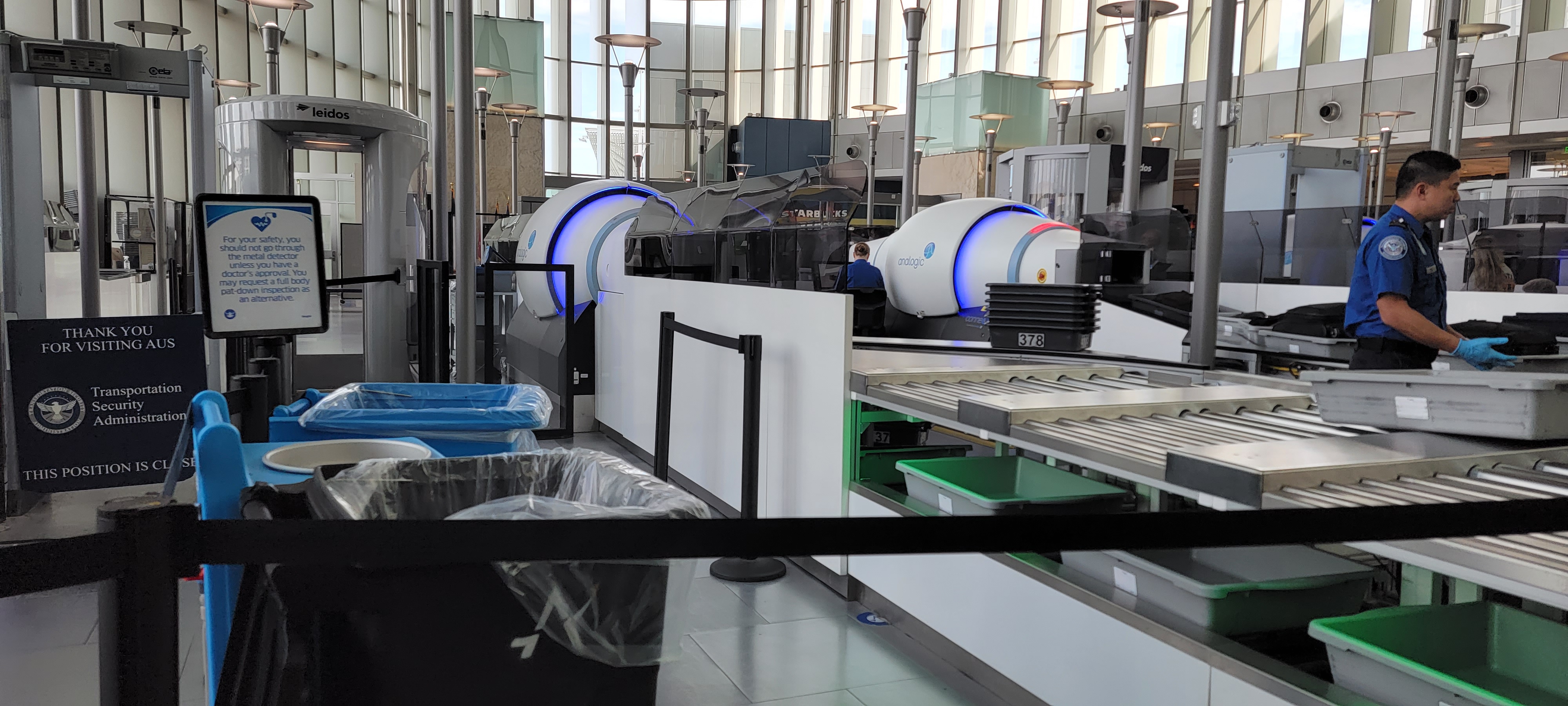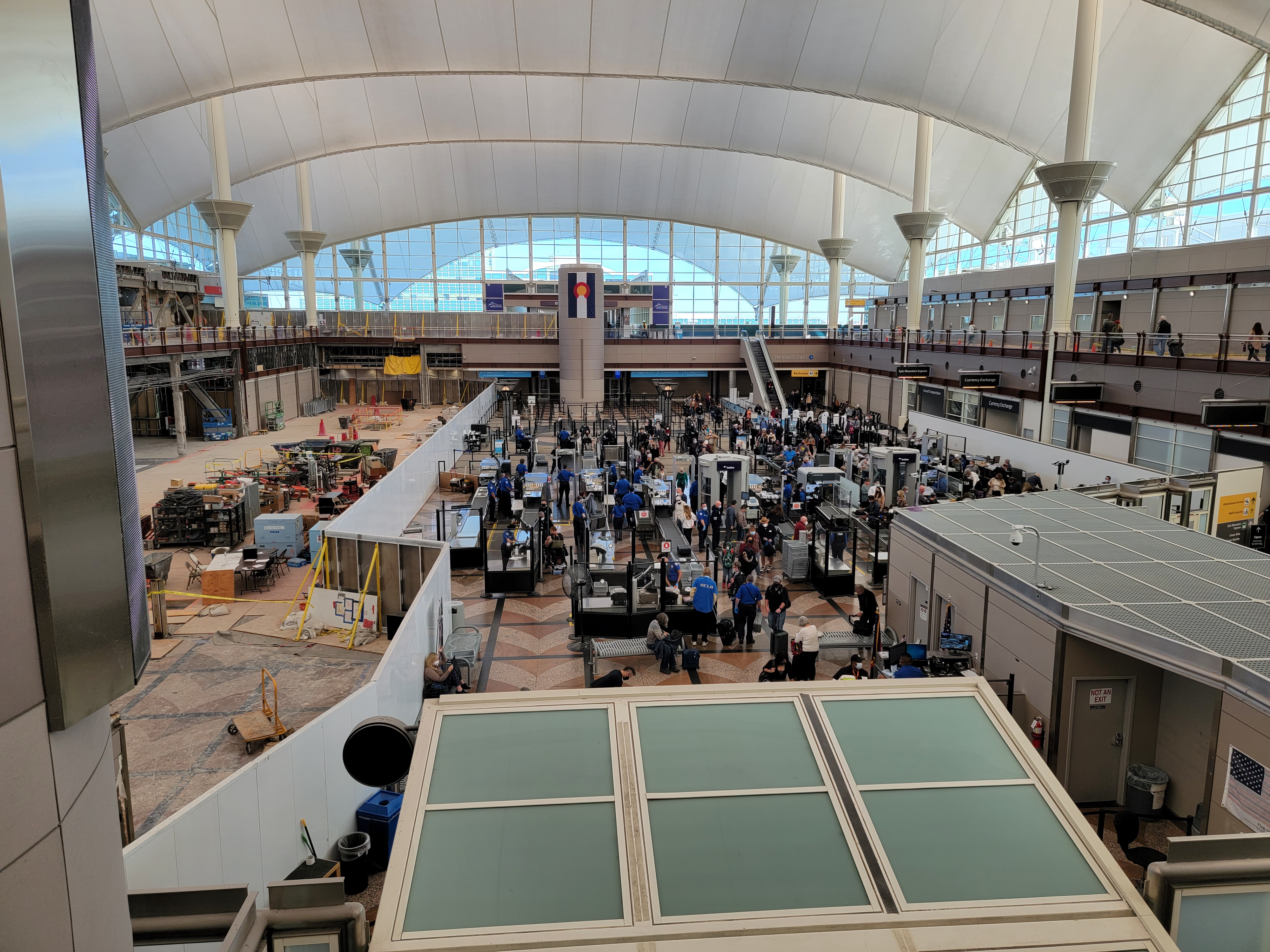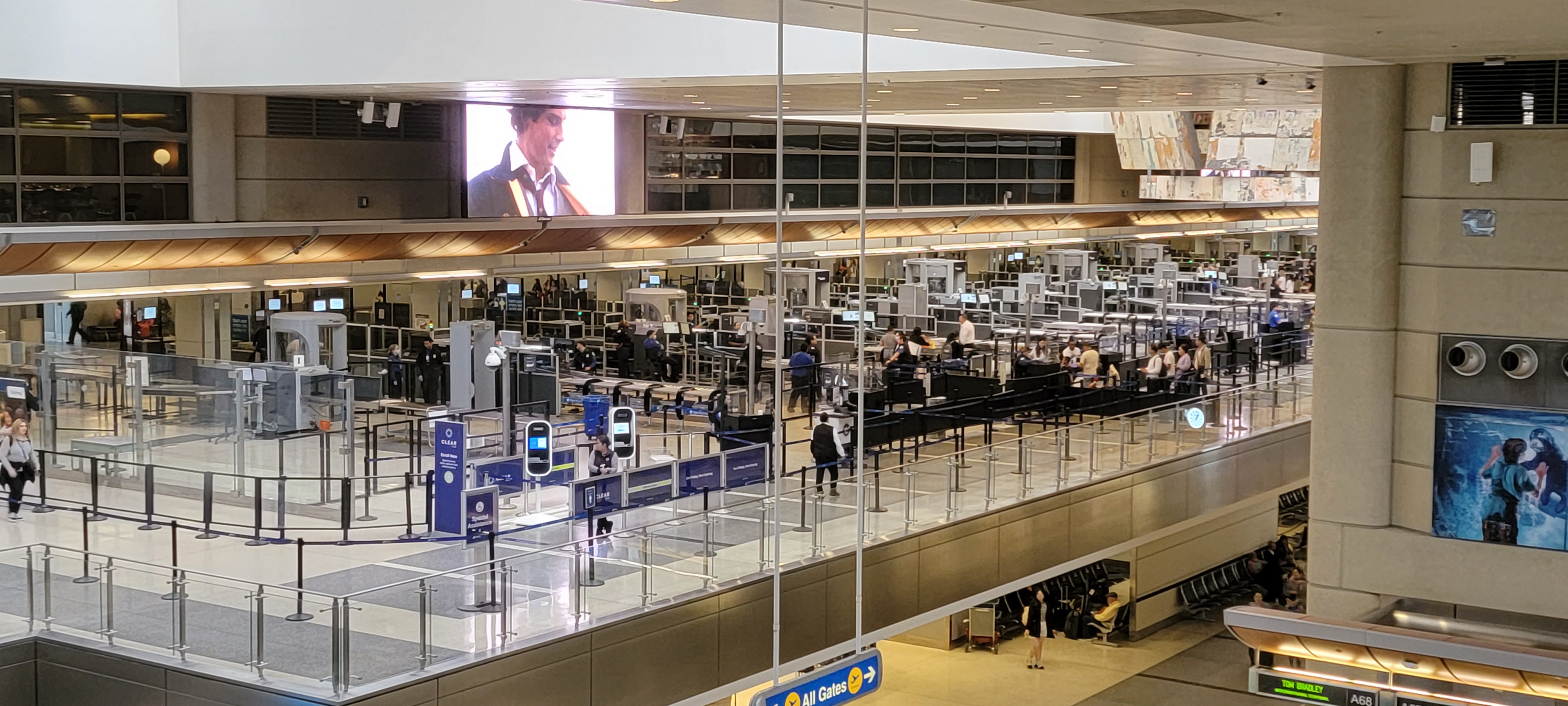The Department of Homeland Security announced plans to end unionization of TSA screeners. Unionization of the screening workforce was forbidden when the agency was set up after 9/11. This was added in the Obama administration.
This was expanded with a new collective bargaining agreement in the last year of the Biden administration. In recent years agency employees were given 25% – 40% raises as a one-off as part of an effort to attract and retain screeners.

According to the agency, a “select few poor performers” current exploit the collective bargaining agreement’s leave policies, and it objects to about 200 screeners working full-time on union business.
A DHS spokesperson says this decision follows the Trump administration’s aim to return “to merit-based hiring and firing policies” and improve security, while ending worker tithing to the union. The union calls this “clear retaliation” for its fighting the administration over terminating federal workers.
- When the Transportation Security Administration TSA was created in late 2001 after 9/11, Congress gave the new agency special personnel authority that differed from most federal agencies.
- The Aviation and Transportation Security Act empowered the TSA Administrator to set employment terms, including whether to allow collective bargaining for airport screeners.
- TSA leadership under the Bush Administration decided not to permit unionization or collective bargaining, arguing that bargaining could impair the agency’s flexibility to respond to threats.

While most federal workers, including in law enforcement (such as Customs and Border Protection), have unionization and civil service protection, agencies with primarily intelligence or sensitive law-enforcement missions – such as the FBI, CIA, and Secret Service – are explicitly barred from collective bargaining. One the one hand, the TSA’s union has argued that its members play an important national security role. On the other hand, unionization at TSA rests on their not doing so.
The issue delayed confirmation of a TSA Administrator, however President Obama eventually reversed the no-union policy at the agency in 2011. This was framed as an effort to ‘improve morale’ (rather than political payback for union support) though it didn’t appear to have that effect.
Bargaining was permitted only on “specific employment issues” such as the performance management process, awards/recognition programs, attendance policies, and shift bidding and not security procedures, deployment of personnel, and compensation. TSA screeners were permitted to bargain over workplace conditions but not wages and benefits or screening procedures. All bargaining had to be done nationally, with no airport locals.

Ultimately, though, unionization at TSA is a determination made by the agency itself. In creating the agency, Congress gave it the power to decide whether or not to collectively bargain with screeners. The Bush administration said no, the Obama administration said yes, and now the second Trump administration is again saying no.
This choice is not an “executive order” per se – President Obama did not issue an executive order, the TSA Administrator issued a determination. However, it is executive authority granted by Congress. A future Presidential administration could again reverse this decision.
In fact, TSA unionization has not made air travel less safe. Inconveniently for the agency, though, that’s because TSA hasn’t made air travel more safe. They have classified subsequent results which made the agency look bad, but they used to report failure rates over 90% in detecting contraband gong through the checkpoint. At one point they admitted in court that they knew of no active threats against aviation. And reinforced cockpit doors and a passenger shift not to be docile in the event of takeover of the aircraft change the threat calculus tremendously.
Earlier, in another controversial move, the Trump administration barred trans TSA screeners from patting down passengers.


Public unions everywhere ought to be abolished.
Unsurprising, and also, unfortunate. Even if you don’t think the TSA should exist (like Gary), prohibiting unions just harms workers. I obviously disagree with folks like @Kirk. This is not a ‘great’ era for labor or for anyone who isn’t already obscenely wealthy. Then again, such policies like this (and all the layoffs, and the uncertainty of trade wars, etc.) will likely lead to recession. Gravity still exists. So, now we wait.
A good start, but the TSA should be privatized.
No comment on whether they should have a union or not. But my understanding is the reason they did get one years back, was due to low pay, poor working conditions, and low morale, essentially they could not get enough people to apply for these jobs. And they did this in part in order to increase number of applicants (allowed a union, to increase applicants; but gave it pretty limited power so they wouldn’t actually have to improve pay etc. if they didn’t want to.)
So… they might get a rude surprise if they can’t get enough screeners and so on. Or, given all these federal layoffs surely increasing the unemployment rate, maybe they’ll get plenty of applicants.
@hwertz — ‘No comment,’ yet you then explain how the union was beneficial to the workers (and ultimately to the government as an employer, and to the flying public, on security/safety grounds, though, again, some, like Gary disagree, oddly). Why must everyone be so afraid to defend good and decent things? No, unions aren’t perfect, nothing is, but they are still worthwhile in many contexts, as here.
Yeah, people hate unions, unless they (or someone they know) is in one and benefits. Kind of like let’s cut all these people from Federal jobs, unless of course it’s you or someone you know (or the effect of services hasn’t been determined yet). That’s human nature, I guess……
“A good start, but the TSA should be privatized.”
No, abolished!
@JRG — Well said. 100%. No notes. This guy gets it.
@Mike P — Welcome back, sir. I knew you’d love this post. You seem to want to abolish everything (TSA, FAA, ATC, etc.) Chaos and anarchy may sound fun theoretically but it just harm us all. I imagine you and others think you’re immune—unless… you’re a foreign agent, seeking our self-destruction. Hmm. You did seem to like Putin…
I completely support unions, coming from a union household. This is a miserable job that, frankly, shouldn’t exist in the first place (I’ll roll the dice since I tend to fly to places that are inconvenient to hijackers). I’m on the workers’ side on this one. DHS (pronounced “douches”) can go hang themselves.
The TSA only exists because the Bush administration refused to sue both American and United out of existence for their lapses in security. Along with prosecuting every executive at both airlines.
Change my mind.
Abolish the TSA and let airports provide their own security.
I’m pretty much with @1990 on this. Weakening TSA by destroying their union is ultimately going to be detrimental to the nation. What the agency needs is an inspector general with motivation to improve efficiency and effectiveness while eliminating the misogynistic good old boy network that dominates the TSA. With the goal of destroying the government in as many facets as possible, the current administration is unlikely to make any changes that are likely to actually improve things for us.
In 2025, the only real purpose of a union in most workplaces is to protect slackers. This is not 1930 auto factories or coal mines…
Just adding more chaos to our current fun. Or maybe to test the waters. Abolish one union for federal employees and if that works then get rid of the rest of them. The semi-independent groups too, like AMTRAK and the Postal Service can be broken. Then you can privatize everything that isn’t nailed down and sell it to the highest bidder. Working conditions will go downhill, quality will disappear, prices will go up and everybody will be happy (well, if you own it).
@Christian — Thanks for the vote of confidence.
@drrichard — It’s definitely a test case. They want to see how far they can go without a backlash. My expectation is that the ‘economy’ will correct this—any downturn is going to brutal to that side in 2026 midterms and beyond. The lies and misdirection can only help so much. This pendulum will swing back.
@Lance — Nope. ‘Slacker’ is pretty subjective, but if someone legitimately isn’t performing, then they should be retrained or let go through whatever fair procedures exist. Sadly, you’re making the same arguments against unions today that those opposed to them likely made in the 1930s as well. None of us here are oligarchs, so I do not know why folks like you are so against workers organizing.
@George N Romey — That’s a horrible take. Almost as bad as #45 abolishing the pandemic preparedness team just before Covid. Lest we forget what lead to DHS and TSA in the first place. I’ve lived in NYC—we haven’t forgotten.
Amazingly, as bad as unions are in private industries, they’re far worse in the public sector.
First, when public unions strike, they strike against taxpayers, who are basically their employers.
Second, while most people argue that unions serve as a means to get workers more of the profits they help generate, government workers do not generate profits. Therefore, public unions merely lobby for more tax money.
Third, government collective bargaining ultimately means voters have less of a say in their own political process and on public policy. Our elected officials instead are forced to negotiate spending and policy decisions with unions versus the people they are supposed to represent. That would appear to be an obvious perversion of democratic processes.
Finally, union contracts make it almost impossible to reward excellent employees or get rid of low performers. Union contracts give government employees gold-plated benefits, at the cost of higher taxes and less spending on other priorities. Ultimately, public sector unions work against the American people on their own dime.
1990 on the topic of gravity existing, I give you the opening of the move La Haine
https://youtu.be/7k6WKHc0tq0?si=dG3sYQe9isAqUDDF
We are currently in the ‘so far, so good… so far, so good…’ phase
@Mike P — How do you feel about police unions? Because usually folks like you make an exception for them, you know, because the police on your team’s side, usually. Still ‘thin blue line’ and ‘back the blue’ or are you now anti-cop?
I wish all federal workers would walk off the job until Elon is fired. This administration is a joke and while I support streamlining and balancing a budget, you need to have a plan and they do not. Shut down the country and then see how the tied turns.
“I wish all federal workers would walk off the job until Elon is fired.”
Please, don’t get my hopes up. Also, who would notice?
Mike P — Do you even live in the US? If our government shuts down (either because of Congress or because a majority of the federal workforce protests or is fired) most of us in the US (especially those who fly frequently) definitely would notice. In fact, it would harm the economy significantly.
So, I repeat, as I asked you above, how do you feel about police unions? Like, are you for, or against them, too?
All public service employee unions should be banned. Negotiating with sympathetic politicians for more of other people’s (taxpayers) money is inherently corrupt.
@Mak
Weren’t you claiming 6 months back that Delhi Airport wouldn’t have issues (like the partial roof collapse then) if it was privatized? Ignoring the fact that Delhi Airport is already private?
Or maybe it was @Mantis. Either way, very entertaining that you don’t let facts get in the way of saying privatization is great. .
Mike P doesn’t seem to understand that federal unions didn’t and don’t have the legal ability to strike. So they don’t strike against the taxpayer dollar if they can’t strike ever anyway.
Unions provide a mechanism to advocate for worker rights and benefits outside the organization’s hierarchy. If workers want to improve conditions, they can use the union to voice their concerns in a clear way and bargain with the employer as a single voice to get what they want. Without the union, they only have to use mechanisms that the employer controls, which usually means zero.
@EB — You had me at ‘Mike doesn’t seem to understand…’ And thank you for adding to the actual ‘common sense’ consensus here that unions are indeed ‘good’ for the workers (and the society at large). It’s sad to see a few (mostly on ‘the right’) bash unions and seek privatization of all public services and entities. If they had their wish, most if not all of us would notice a decline in those services. The propaganda is just that good these days—folks willing to promote ideas that go against our individual and collective self-interest, but for a few oligarchs. I hope more people will wake up to reality soon.
“Mike P doesn’t seem to understand that federal unions didn’t and don’t have the legal ability to strike.”
I wrote “public” unions and while most states do deny their unions the right to strike, it isn’t universal.
“Unions provide a mechanism to advocate for worker rights and benefits outside the organization’s hierarchy.” I never said they didn’t. But this doesn’t change any of the inherent problems with public unions.
“Without the union, they only have to use mechanisms that the employer controls, which usually means zero.” That’s the case with all employees, whether unionized or not. Employees still have ultimate control of their own labor and can take their services to another company whenever they want.
You didn’t address any of the problems I mentioned about public unions. Instead, you simply provided reasons for why you support them.
Hmm, it appears Mike P does understand.
Drrichard has it exactly right.
Got some underperforming workers? Too many doing union work? Go through the union contact that MANAGEMENT agreed to. Abolishing the union is not the answer.
Whether it is by the government or private sector, let’s agree that security screening must be done. Either way, the cost of security screening will be embedded in one’s ticket price. If it is the private sector, I’d bet the workforce would be unionized. So, what is it exactly that we are trying to accomplish?
@Mike P — Naw, you still don’t get it. And just because no one is willing to entertain your ‘crack pot’ theories against unions, doesn’t mean that you’ve ‘won’ or that you’re ‘right’ about this or any topic. Speaking of, for the third time, you’ve ignored my question about ‘police unions’—I suspect it is because that’s an exception for you; and it is indeed hypocritical for you to ‘hate’ on nearly all unions, but likely still support the cops, because they’re often on ‘your team’ as a conservative, libertarian far-right yahoo. Hmm.
@Fred conservative agitators/traitors don’t care about what is trying to be accomplished as long as they ruin someone’s life they don’t like
F the mall cops. Seriously.
Union busting by the Generalissimo Krasnov regime? This is just the opening round folks.
None of this should be a surprise folks. We were all warned and there’s no reminding back now. They play for keeps.
Union busting by the Generalissimo Krasnov regime? This is just the opening round folks.
None of this should be a surprise folks. We were all warned and there’s no reminding back now. They play for keeps.
*turning back #autocorrect
Yes…because it worked so well the last time a union was abolished (Ronald Regan fired all the unionized air traffic controllers, and we are still short-handed!)
At the airport I worked in for many years, the stories about the TSA workers and how they managed to not really work, not to mention all the other stories, would make you blush. Does the Union protect these people, of course they do. The Union does not care if they do the job they were hired to do. They also do not care about the quality of the people hired. It is a body and it is Union Dues so the fat cat Union Reps and Union Big Shots can collect, more and more money. And I grew up in a Union household. No thank you, I have too much self respect.
I came back to say: Mike P couldn’t handle the heat—he never responded on the example of police unions, which often are an exception for folks like him who oppose all other unions, because they cannot stand being called ‘cop haters’ when the police often back their unjust social policies. Unlike @cairns who’s a simple bigot (who often shouts quick hateful nonsense as he did above), Mike P will try to rationalize his animus with fake ‘intellectualism’ backed by nothing but rhetoric, not empirical evidence or anything that can withstand actual scrutiny. The truth remains that unions are overall good for workers and the middle class. Period. Banning them is bad for nearly all people, except oligarchs. Period.
TSA is makework program to make the number of people on outright benefits look smaller. The idea that the useless slugs in it should be making any “demands” on anyone is ludicrous, above and beyond the issues with public employee unions in general.
If you can’t do better than TSA, be grateful you aren’t being ground up into animal feed, which would be more productive.